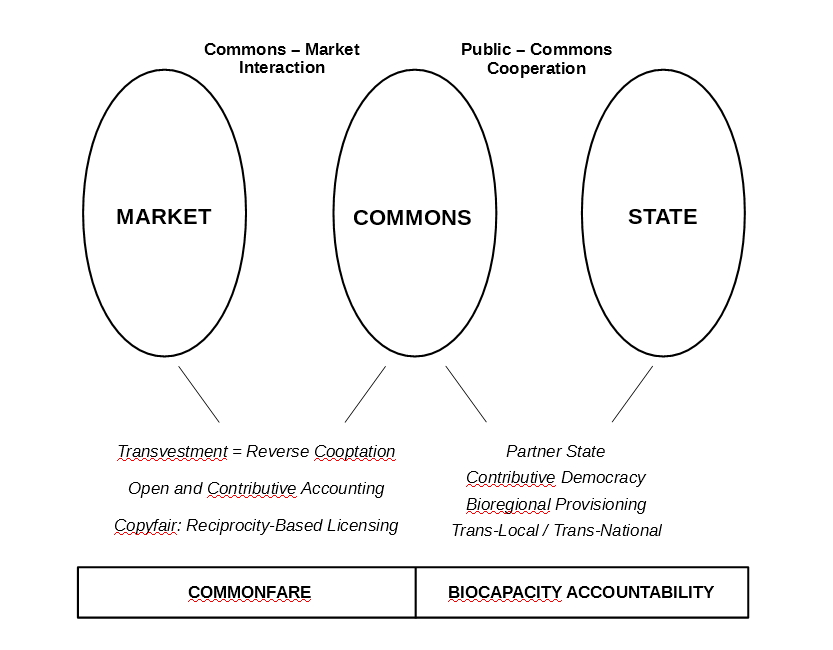Evolution of Research at the P2P Foundation
Discussion
Michel Bauwens:
Is there some kind of emerging logic in the research of the P2P Foundation, I believe that, with hindsight, there is, and here is my attempt to summarize these insights of where we have been, where we are, and where we may be going.
The first phase was an investigation of past historical transitions and the particular dialectic that we believe we can see between the prefigurative construction of seed forms, the interconnection of them in subsystems, and the 'coming to fruition' of the new social norms after major social and political conflicts. This is roughly a phase I would place in the period 2003-2006, before the creation of our online presence.
In the second phase, we focused on peer to peer dynamics and the creation of contemporary commons, mostly by observing the 'three-in-one' institutional dynamics of digital commons and their surrounding economies. I would say this is roughly the period 2007-2010.
Thus emerged a need for more deep investigation which focused on the creation of ethical livelihoods and especially the interaction between the commons and the market; how to avoid extractive relations and create market forms that are commons-compatible and commons-friendly, which culiminated in quite specific ideas on commons-market institutional design. Roughly the period 2010-2014. It was expressed succinctly in our study Value in the Commons Economy.
2014 was the year of an important pivot in our work as we were asked to examine the transition of the nation-state of Ecuador towards a social knowledge economy. Invited by three institutions, we focused on how to create shared knowledge commons for each domain of social and economic life, and what the material and immaterial conditions were for their realization. What we could not do for lack of mandate and means, was looking at actual material commons. But this is exactly what we did in Ghent in the spring of 2017, which was a investigation focusing on the very material urban commons that are growing exponentially in European cities, and are building alternatives for the allocation of value in nearly all vital provisioning systems. Our focus both in Ecuador and Ghent has been on institutional design for public-commons cooperation. This is roughly the period, 2014-2017.
I think that with the combination of our insights in commons-market and commons-public institutional design, we have a handle on the emerging forms of cooperation between these three vital domains of economic, social and political life, i.e. the civil society of commoners, the ethical entredonneurial market coalitions, and the enabling and facilitating partner state.
But note that these material commons allocate already produced resources, they are not yet making them. So a parallel tracked was developed around DGML (Design Global, Manufacture Local), also called cosmo-local production, with the help of our substantial P2P Lab and other researchers like Jose Ramos in Melbourne. This parallel track on the conditions for sustainable commons-oriented physical production brings us naturally to our next phase of research, which is symbolized by our publication, the Thermo-Dynamic Efficiencies of Peer Production, written by Celine Piques and Xavier Rizos, which looks at the underlying bio-physical conditions and capacities. How can the social construct of the political economy of the commons, know the limits of its resource base, is a key research area for the next few years, and we are working with experts such as James Quilligan and Sharon Ede (AUDAcities) to help us progress on that front.
The above description does not exhaust our interests. For example, we have been struggling quite a bit on the intersection between the commons and the care economy, and the inherent gender inequality of a dominant system which doesn't recognize vital care as valued contributions, and therefore how to imagine solidarity and welfare systems that can cover the risks of all contributions. For the next three years, I will work with SMart, the fast growing European cooperative and mutualist labour mutual, which has developed working solutions for precarious autonomous workers, by creating salaries with welfare benefits. An important line of investigation for myself will be looking at the welfare systems of tomorrow, i.e. those that are no longer tigthly linked to salaried jobs that require the subordination through labour contracts, but also build rights and benefits around contributions, this includes life-long learning, engagement with care, but also contributions to nonprofit activities and the commons. Will this also include a universal basic income requirement, is one of the possibilities we need to investigate ...
So imagine three circles representing the three major societal institutions, but under it, the ecological and social requirements that we all need to make such a system work. I feel we have a good handle on the superstructure, but a lot more work needs to be done on these underlying requirements.
